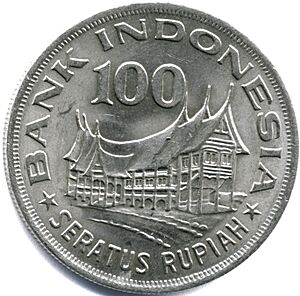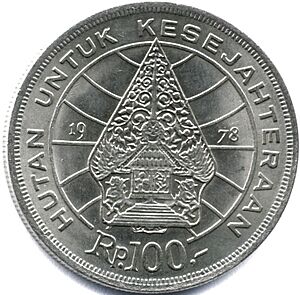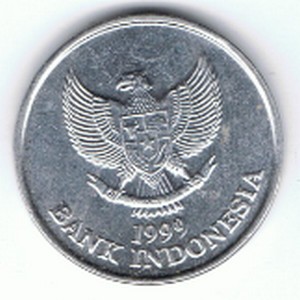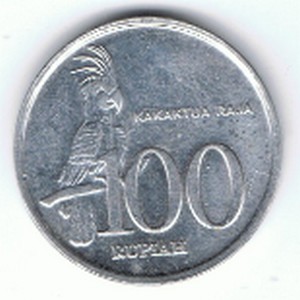Indonesian 100-rupiah coin facts for kids
| Indonesia | |
| Value | Rp 100 |
|---|---|
| Mass | 1.79 g |
| Diameter | 23 mm |
| Thickness | 2 mm |
| Edge | Smooth |
| Composition | Cupronickel (1973-1990) Aluminum-bronze (1991-1998) Aluminum (1999-present) |
| Years of minting | 1973-present |
| Obverse | |
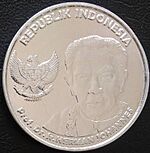 |
|
| Designer | Bank of Indonesia |
| Design date | 2016 |
| Reverse | |
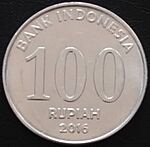 |
|
| Designer | Bank of Indonesia |
| Design date | 2016 |
The Indonesian one hundred rupiah coin (Rp100) is a type of money used in Indonesia. It was first made in 1973. Since then, its design and the materials it's made from have changed four times.
When it was first created, it was made of a metal mix called cupronickel. Later, it changed to aluminum-bronze in 1991, and then to aluminum in 1999. As of 2022, it's the second lowest value coin in Indonesia that you can still use, right after the Rp50 coin.
Contents
First Rp100 Coin (1973)
The first Rp100 coin came out in 1973. It was made of cupronickel, which is a mix of copper and nickel. This coin weighed about 9.72 grams and was 28.5 mm wide.
- Front (Obverse): It had the number "100" in the middle. Around it, you could read "BANK INDONESIA" and see two stars, along with the year it was made (1973).
- Back (Reverse): This side showed a rumah gadang, which is a traditional house from West Sumatra. The words "Rp 100" were placed above the house.
- Edge: The side of the coin was smooth and had "BANK INDONESIA" written on it.
About 252 million of these coins were made in 1973. These coins were officially taken out of circulation on June 25, 2002.
Second Rp100 Coin (1978)
In 1978, the Rp100 coin got a new look. This version was a special coin to celebrate the FAO (Food and Agriculture Organization), which is part of the United Nations and works to end hunger.
- Front (Obverse): The rumah gadang (traditional house) was moved to the front of the coin. It also had "BANK INDONESIA" and "SERATUS RUPIAH" (which means One Hundred Rupiah) written on it, plus the two stars.
- Back (Reverse): This side featured a gunungan, which is a special shape used in Javanese wayang (shadow puppet plays). It was placed over a picture of the globe. The words "HUTAN UNTUK KESEJAHTERAAN" (FORESTRY FOR PROSPERITY) were also on this side, along with the coin's value and the year (1978).
This 1978 coin was lighter and thinner than the 1973 version. Its edge also changed from smooth with writing to a reeded edge (meaning it had small ridges). Over 907 million of these coins were made. Like the 1973 coins, these were also taken out of circulation on June 25, 2002.
Third Rp100 Coin (1991-1998)
The Rp100 coin was updated again in 1991. This time, it was made from aluminum-bronze. It was smaller and lighter than the previous coins, with a smooth edge that had no writing.
- Front (Obverse): This side featured the national symbol of Indonesia, the Garuda Pancasila. The words "BANK INDONESIA" were smaller and placed at the bottom, along with the year it was made (between 1991 and 1998).
- Back (Reverse): This side showed a picture of karapan sapi, which is a famous bull-racing event from Madura. The coin's value (Rp 100) and the words "Karapan Sapi" were also on this side.
These coins were officially taken out of circulation on November 30, 2006.
Fourth Rp100 Coin (1999-2005)
In 1999, the Rp100 coin changed for the third time. The biggest change was that it was now made of aluminum, making it much lighter. It had a smooth edge.
- Front (Obverse): The front of the coin stayed the same as the 1991 series, still featuring the Garuda Pancasila and "BANK INDONESIA".
- Back (Reverse): This side got a new design. It showed a picture of a palm cockatoo, which is a type of large black parrot. The words "KAKAKTUA RAJA" (PALM COCKATOO) were to its upper right, and "100 RUPIAH" was to its lower right.
Fifth Rp100 Coin (2016)
The most recent update to the Rp100 coin happened on December 19, 2016. This was part of a new series of Indonesian money that featured national heroes.
- Front (Obverse): This side now shows the national symbol, the Garuda Pancasila, on the upper left. To its right, there's a picture of Prof. Dr. Ir. Herman Johannes, who was an important Indonesian scientist and national hero. The words "REPUBLIK INDONESIA" are at the top, and "Prof. Dr. Ir. HERMAN JOHANNES" are at the bottom.
- Back (Reverse): This side has a simpler design. It shows the coin's value, "BANK INDONESIA", and the year it was made (2016).
See also
- Indonesian rupiah
- Coins of the rupiah
 | Madam C. J. Walker |
 | Janet Emerson Bashen |
 | Annie Turnbo Malone |
 | Maggie L. Walker |


